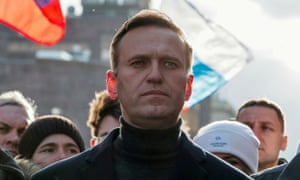Navalny: Putin’s Nemesis, Russia’s Future? review – slick, slippery and brave
An engaging academic study of Alexei Navalny paints a vivid picture of a Russian politician who is a necessarily courageous product of the internet age

In January, Alexei Navalny boarded a flight to Moscow. Russia’s most famous dissident had spent five months in Germany recovering from the effects of novichok poisoning. Surrounded by journalists who travelled with him, he was under no illusions as to what would happen once he swapped Berlin for home.
The Russian authorities would arrest him, for sure. He would spend months, years, in prison. Probably he would never emerge. On the plane, Navalny shrugged off these concerns with his usual dark humour. “I am not afraid,” he said. He spent the flight watching his favourite show, the US cartoon sitcom Rick and Morty.
Was Navalny’s decision to face down Vladimir Putin an act of supreme courage, a modern-day echo of the doomed revolt by the Decembrists against autocratic rule? Or was it suicidal folly? After all, Navalny embodies the best chance for democratic change inside Russia since the crumbling of the USSR.
As Navalny had gambled, his arrest in Moscow sparked big protests against the Kremlin. Demonstrators took to the squares of 180 towns and cities, from occupied Crimea to Vladivostok. They demanded his release. But this not-quite revolution never really threatened Putin’s two-decade rule or dented his control.
While Navalny sits in jail, Putin appears ready to carry on as president well into his 80s. Security forces have quelled the street protests for now using time-honoured tactics: brutal force, mass arrests and enhanced persecution for a few. More repression is under way. Dissent, the message goes, has nasty consequences.
Over the space of a few months, the authorities have rolled up Navalny’s formidable anti-corruption movement, banning his countrywide network of local campaign offices. They have shut down Russia’s few remaining independent media outlets as well, branding them “foreign agents” and “undesirable”. Free speech is in trouble.
With alarming speed, Russia is edging towards what the authors of a new study call “full-blown dictatorship”. The three non-Russian academics – Jan Matti Dollbaum, Morvan Lallouet and Ben Noble – have written an engaging and timely book about Navalny the man, the politician and the protester.
Its subtitle asks: “Putin’s nemesis, Russia’s future?” No one quite knows if Navalny is indeed Russia’s destiny or a tragic national footnote, fated to be finished off by the same bungling FSB spy agency team that last summer tried to kill him in Siberia, poisoning his underpants.
The book convincingly argues that Navalny is the most interesting and significant figure to emerge from the post-communist period. It traces his early career as a blogger and activist to his present status, as Putin’s globally recognised arch enemy and biggest headache.
Navalny is neither Nelson Mandela nor Alexander Solzhenitsyn, the authors suggest. Instead, he is himself: inspiring, complex, charismatic, brash and superbly media-savvy. And funny too, his humour a cudgel used to bash his enemies. Above all, Navalny is a politician, tactically flexible, contradictory and polarising.
Born in 1976, Navalny came from a generation that grew up in the USSR but was never defined by it. In the 1990s, he worked as a lawyer and a stockbroker. A right-wing, pro-business “punk”, according to friends, he entered politics during the early Putin era as a worker with the liberal Yabloko party.
The party expelled him in 2007 after he joined a march of Russian nationalists in Moscow. Many of those attending were neo-Nazi skinheads. Navalny once likened Chechen terrorists to cockroaches and still advocates a visa regime for central Asian guest workers.
Does this make him racist? Navalny has never fully disavowed his early radical views, though his platform these days is that of a mainstream, pro-European, social democrat, more left than right. The book explains Navalny’s forays into nationalism by quoting his view that an opposition needs to be popular. Only then can it be effective.
It was Navalny’s campaign against rampant state corruption that got him noticed. He probed the ownership of corporations and private companies such as the oil trader Gunvor. (The US Treasury says Putin benefits from it; the firm denies this.) When I met him in 2010, Navalny sketched out schemes for me on a giant whiteboard.
The following year, Navalny addressed anti-government rallies and came up with a memorable slogan for the ruling United Russia party – the “party of crooks and thieves”. He ran an impressive campaign to become Moscow mayor, winning a third of the vote. Then in 2012 he launched FBK, an anti-corruption foundation. This became his main political vehicle.
The authors write well about the role played by corruption in Russian politics. They note that under Putin stealing has shifted from being something that undermines state control into a tool for disciplining the elites. Everyone is complicit. And therefore vulnerable to punitive criminal charges. “Stealing is organised to buttress power,” the book asserts.
It adds that Navalny’s rise has only become possible because of the internet. Shut out from state TV and smeared in the Kremlin media, Navalny has turned to the online world to get his ideas out. He has developed an audience through slick YouTube videos, a daily show and Instagram and Twitter channels, where he has 2.6m followers. (Putin, a techno-dinosaur, doesn’t use email.)
In his cat-and-mouse battle with the authorities, Navalny has employed ingenious tactics. His aides have flown drones over the palaces of Russia’s venal KGB overlords. The FBK investigation into Dmitry Medvedev, Russia’s one-time president and PM, was a bravura piece of storytelling and sleuthing. It began with Medvedev’s trainers and ended with lavish homes and a Tuscan vineyard.
Even critics recognise Navalny is courageous. His blockbuster investigation into Putin’s Black Sea palace was released just after his return to Moscow. Navalny depicts Putin in scathing terms, as a small-time bureaucrat who graduated from stealing cassette recorders as a junior spy in east Germany to looting an entire country. “A thieving little man in a bunker” in Navalny’s jibe.
The three academics say the Kremlin takes the threat posed by Navalny seriously. It has jailed him on various occasions and filed criminal charges. In 2017, it blocked him from standing to be president. Last year, an exasperated Putin gave a secret order to have him killed, Navalny alleges. Two of the Russian doctors who treated him for novichok poisoning have met mysterious deaths.
Thus far, Putin has acted ruthlessly in quashing rivals, but the book points out that his regime is adaptable and realistic. It has worked hard to gain the support of ordinary Russians and to build an emotional connection with them. As Navalny himself recognises, Putin is popular. Even with fair elections and a free media, Putin might just beat Navalny in a head-to-head poll.
Not that this will ever happen. Navalny has talked cheerfully about his previous stints behind bars, saying that he gets to meet people from all walks of life and has an opportunity to read. His supporters are convinced he will eventually prevail against an older generation obsessed with the ghosts of the past and Soviet geopolitical fantasies. Maybe. For now, though, his life hangs by a thread.
Luke Harding’s Shadow State: Murder, Mayhem and Russia’s Remaking of the West is published in a new updated edition by Guardian Faber
Navalny: Putin’s Nemesis, Russia’s Future? by Jan Matti Dollbaum, Morvan Lallouet and Ben Noble is published by Hurst (£20). To support the Guardian and Observer order your copy at guardianbookshop.com. Delivery charges may apply



